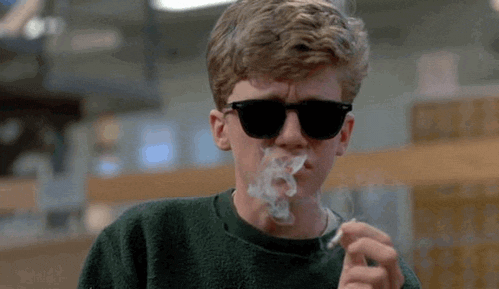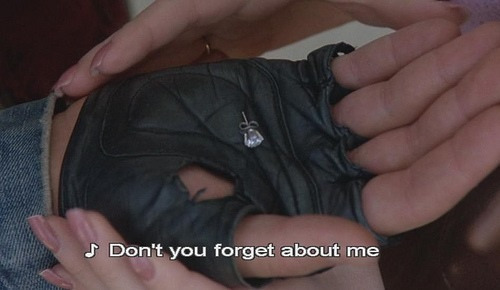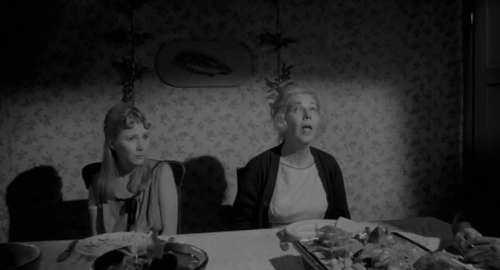Follow my blog with Bloglovin
Myskool
I like time-travel. ANY movie gets better with time travel, that is Myskool's first law of cinema. No one's going to argue that Pearl Harbour would not have been a better film if somewhere in the third act, the Americans and Japanese had to unite to fight some high-tech aliens that -GASP- turn out to be HUMANS, just like Soylent Green. Now, my probably disrespectful allusion to the changes to Michael Bay's unforgettable (for all the wrong reasons) film have brought up a second law of cinema that has been past down in my family for generations (...well, one at least); Nazis make the most compelling villains in any movie. I have yet to find an exclusion to this rule and though it has become a cliche, it still rings true. Pop on The Rocketeer and you forget it's a low rent Indiana Jones.
Following The Rules
I just remembered what I was supposed to be writing about, a film that yet again proves my two cinematic rules; Tomorrow I Will Wake Up and Scald Myself with Tea which is such a wonderful title that I refuse to turn it into an acronym. Within the first 2 minutes it is evident that both of these rules will be put on display magnificently. Time Travelling Nazis? Taking anti-aging pills in a very 70s looking 90s? Well, I know I'm in.
The plot follows one of two twins as he pretends to be the other twin, that unbeknownst to the first twin is complicit in the Nazis time travelling scheme. You see the first twin believes the second twin to live a James Bond style life of luxury and adventure. When in actuality he's a scum bag whose got many affairs going and travels back in time daily for his job. A pilot for a commercial time travelling company which, I'm just sayin' seems like a sort of reckless, casual use of something that could majorly effect the lives of people, especially because it seems seriously understaffed by security.
Meshell
Released 1977 Directed by Jindřich Polák Starring Petr Kostka Comical Science Fiction genre Synopsis found here
I like time-travel. ANY movie gets better with time travel, that is Myskool's first law of cinema. No one's going to argue that Pearl Harbour would not have been a better film if somewhere in the third act, the Americans and Japanese had to unite to fight some high-tech aliens that -GASP- turn out to be HUMANS, just like Soylent Green. Now, my probably disrespectful allusion to the changes to Michael Bay's unforgettable (for all the wrong reasons) film have brought up a second law of cinema that has been past down in my family for generations (...well, one at least); Nazis make the most compelling villains in any movie. I have yet to find an exclusion to this rule and though it has become a cliche, it still rings true. Pop on The Rocketeer and you forget it's a low rent Indiana Jones.
Following The Rules
I just remembered what I was supposed to be writing about, a film that yet again proves my two cinematic rules; Tomorrow I Will Wake Up and Scald Myself with Tea which is such a wonderful title that I refuse to turn it into an acronym. Within the first 2 minutes it is evident that both of these rules will be put on display magnificently. Time Travelling Nazis? Taking anti-aging pills in a very 70s looking 90s? Well, I know I'm in.
The plot follows one of two twins as he pretends to be the other twin, that unbeknownst to the first twin is complicit in the Nazis time travelling scheme. You see the first twin believes the second twin to live a James Bond style life of luxury and adventure. When in actuality he's a scum bag whose got many affairs going and travels back in time daily for his job. A pilot for a commercial time travelling company which, I'm just sayin' seems like a sort of reckless, casual use of something that could majorly effect the lives of people, especially because it seems seriously understaffed by security.
That doesn't work like that... WHO WROTE THIS??!!
I usually am that jerk that gets annoyed when people point out illogical plot points in fantasy/science fiction movies. The amount of times I've stood up for the end of Superman when he apparently spins the world backwards so it goes back in time so as to save Louis is innumerable. Which as an aside and for the sake of the people who don't already know, is not what happens. Superman actually spins around the earth so quickly that he himself actually travels back in time, I'm not saying that that makes anymore sense, but people get pretty defensive about it. But my point is, when you're watching a movie where a man is wearing red underpants on top of his blue tights, shooting fire from his eyes and flying around with a lady who is internally monologuing some weird shit, why is it such a leap of faith to accept he did something else so unreal.
The reason I mention this though is that I believe movies should follow the rules that they set (in addition to those two rules I stated in my introduction). For instance when Biff goes back in time to give Young Biff the sports almanac in Back to the Future II he can't go back to the 2015 that he left from because he has created a new timeline altogether. Which, GREAT SCOTT, Doc Brown tells us not 30 minutes after we watch it happen. The same shit happens in this movie where the main character essentially says, after returning from the past, that they have to avoid their past selves (a trope typical in this sort of movie) but later when they come back a second time there should technically be two of him already in attendance but one of them appears to have completely vanished. Maybe I was confused but I think I've got this right, it shouldn't matter but it does bug me. I think that if I were writing a time travel movie I'd make it real tight so that the only conceit is that time travel does in fact exist. Though this shouldn't matter too much as this is a comedic film and so I guess logic has to be put aside for jokes occasionally.
This isn't something that annoyed me but definitely made me inquisitive but why did the time machine have to go into space to work and then land back on the Earth in the past? Someone tell me that one.
The CHF Factor
One thing I feel I haven't addressed explicitly enough is the hilarity of particular moments in this film, if you plan to watch it I especially reccommend watching out for the Chicago couple that get sent back in time on the same commercial vessel as the Nazis and are really enjoying the holiday, making mundane comments and asking to have their photo taken with Hitler. Yes, Shirley and Patrick are the heart and soul of this film.
Furthermore, Tomorrow I'll Wake Up and Scald Myself with Tea is host to one of the finest Cinematic Hitler Freak-outs (CHFs). On the standard scale of CHF, this film's would fit somewhere between Downfall and Inglourious Basterds. It'd probably be equaled to the moment in The Great Dictator when the führer addresses 'the Jewish people' (not the heartwarming speech that everyone remembers at the end, the hilarious one posted below... for posterity).
Meshell
Honestly, I didn't think I could enjoy a film within the genre of comical science fiction - especially one with subtitles - as much as this. This is a Czech time travel romp with it all; Nazis, funk music, space suits, 70's technology and the words 'hydrogen bomb' spoken in Czech. There is nothing funnier that the words 'hydrogen bomb' spoken in Czech. 'Hail Hitler' by a Czech-speaking parrot comes in as a close second. Just watch the intro (below):
Love me some funk, backwards goose-stepping and whatnot.
Lindsay Lohan, Doctor Who and I don't even know who is dead or alive or both
Tomorrow I'll Wake Up and Scald Myself with Tea has one actor playing twins. That's right, it's The fucking Parent Trap well and truly before LiLo's time. At times, it even becomes almost difficult to differentiate between the films. There's matchmaking aplenty, however no ears were pierced or estranged parents of identical twins reunited. Let's just say this is The Parent Trap of European film, so naturally as is always the case in European film, in the absence of nudity there is so much death. Too much death. Too much, very confusing death.
If I've got it right, one twin dies three times, the other twice. One guy is killed by his past self (is this murder or suicide?), another his future self (again, murder or suicide?) and from there I get a little lost. People appear in scenes following the ones in which they've just died in harrowing trampoline rooftop tragedies.
On the topic of death in Tomorrow I'll Wake Up and Scald Myself with Tea, it seems to raise a myriad of time travel questions. I'm no expert, but this film seems to take a leaf out of Doctor Who in David Tennant's time in the way it is 'wibbly wobbly timey wimey.' What I mean is the laws of time travel are relevant as much as they're ignored for the sake of the plot.
'My brother died this morning. He choked on a roll.'
The above quote appears in the film over and over. The actual scene in which Twin 2 chokes on a roll and dies is revisited again and again, all with different outcomes and all beginning with Twin 1 scalding himself with tea. They are all threaded together with a thread from the same cotton spool of what the actual fuck. Always accompanied by inappropriate funk music, sometimes with the liberties of the 70's ideal of future technology, namely a dish soap that acts much like caustic soda times a million.
I found myself just as confused about the characters' motivations as the many deaths. There are multiple switcheroos (briefcases, identities, love interests) that are hard enough to follow without the multiple timelines. But honestly, who cares. If time travel by Nazis to equip Hitler with a hydrogen bomb is foiled by an identity switch (or several) then I'm all for saving the world with a bit of time trickery (or is it fuckery?).
They say a picture is worth a thousand words, however this freeze frame at the end of the film can be summed up in one; konec (Czech for the end) or two... fuck yeah!







































